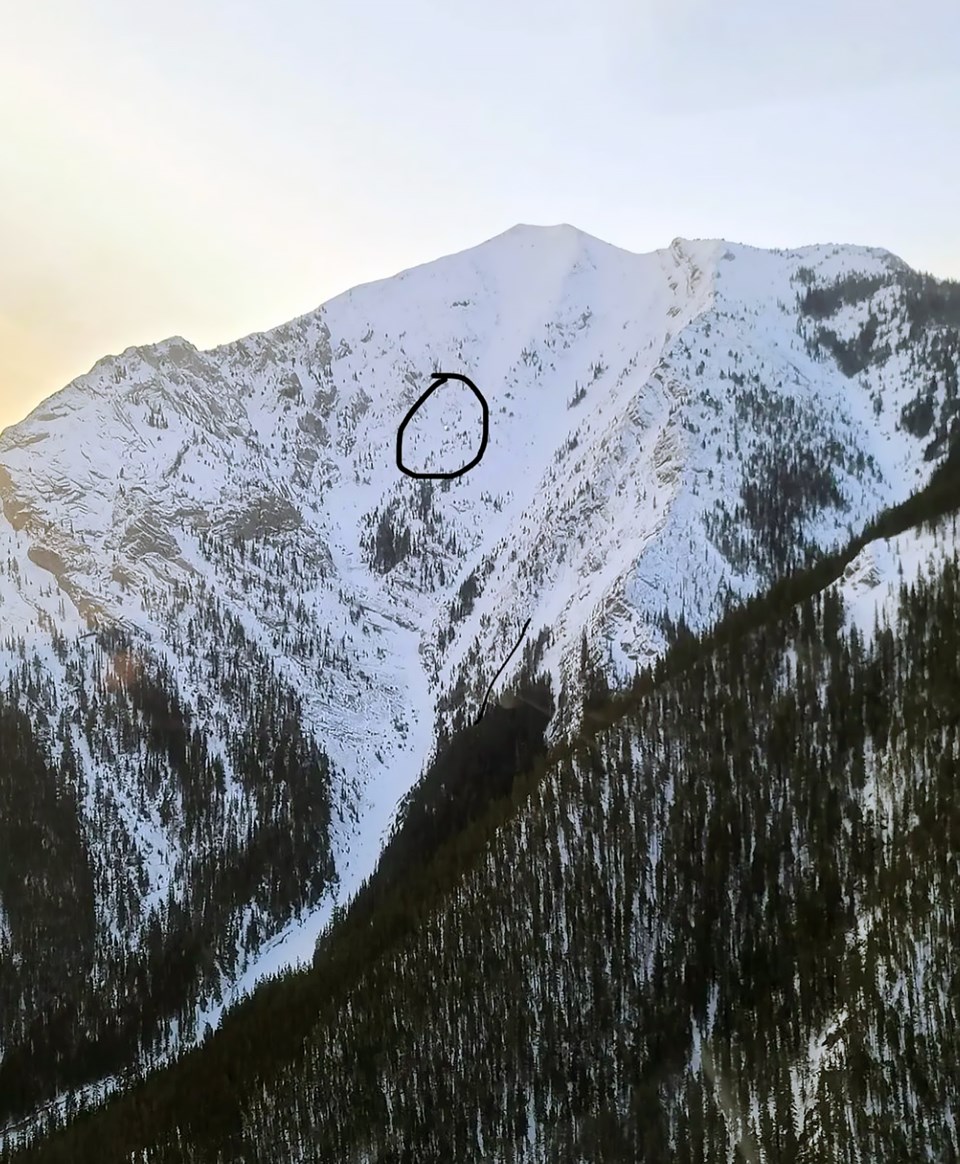KANANASKIS – Two men and their injured dog spent a long, cold night in the mountains with their two rescuers after the scramblers' attempt to take a shortcut earlier that day went horribly wrong.
Kananaskis Country Public Safety specialists responded to a call for help on an SOS device Sunday (April 17) from two men who decided to take a shortcut off a scramble route referred to by locals as Midnight Peak, near Baldy Pass, and got stuck in dangerous terrain that was no longer navigable.
With darkness fast approaching, it was getting too late for an Alpine helicopter to fly. Two rescuers hiked in and spent the night with the two men and their dog on the side of the mountain, all eagerly awaiting a flight out at daybreak the following morning.
“They had warm clothing and they were able to start a fire and they were reasonably well equipped, but they made a few tactical errors and ended up having to spend the night,” said Jeremy Mackenzie, public safety specialist for the Kananaskis region.
“One was to try to take the shortcut – they thought they were following human tracks for a while, but eventually they realized they were following animal tracks – and the second thing is they had a dog with them and the dog ripped up its paws and could no longer walk.”
The alarm was raised at about 8 p.m. on a SPOT satellite communication device. The two rescuers set out with some extra high-energy food, overnight gear and supplies, as well as crampons and ice axes because of the type of terrain the two scramblers had found themselves in after taking the shortcut.
By midnight, the rescuers reached the snowy, slippery location, where they found the two men huddled around a fire they had started earlier in the evening to try to stay warm as nighttime temperatures begin to plummet.
“The original intent was to see if there was any way we can move to a better location or even possibly escort them out,” said Mackenzie.
“But given the darkness, and the fact their dog basically couldn’t move, and they were exhausted, and the terrain was very slippery and actually quite dangerous directly below them, the rescue team decided to stay put for the night.”
Temperatures hovered around minus 14 degrees Celsius throughout the night, but Mackenzie said there was, luckily, not very much wind.
“Everyone was cool, but they were prepared well enough that they managed,” he said.
“It sounded like everyone was in fairly good spirits and fairly healthy. It was just an uncomfortable night.”
Back in Canmore, other members of Kananaskis Country Public Safety were in constant contact with their counterparts up on the mountain.
“We knew everything was OK, but we still wanted to get them off the mountain as soon as we could in the morning, “ said Mackenzie.
“A conservation officer and myself went to the hangar at first light and we were able to fly in. We quickly located them and did a heli-sling rescue for all of them. I think everyone was probably off the mountain by 7 o’clock, 7:15 a.m.”
K-Country public safety specialists say there are several lessons to be had following this incident.
As enticing as shortcuts may be, they rarely work out and account for a large portion of rescue call volumes.
They say gully and creek features typically contain steep terrain and waterfall ice in the winter, so Mackenzie said it’s best that people stick to established routes and do proper route planning before heading out.
“Don’t take that juicy looking shortcut, because it’s usually not going to work out, and that’s part of what contributed to that incident,” said Mackenzie.
Proper clothing and equipment when venturing into the mountains are also critical.
Mackenzie said there is more hiking and scrambling, but right now the peaks are in complete winter condition.
“Although these guys had some of the correct gear, the things they didn’t have is things like crampons and ice axes, and they were definitely in terrain where you could have and should have that kind of equipment,” said Mackenzie.
“In some cases, the micro-spikes aren’t enough – to be fair, they did have micro-spikes and snowshoes – but that wasn’t the right tool for the particular place they were in. Another big thing is being prepared for that possible night out and that helps contribute to a good outcome.”
Communication devices also play a vital role in rescues. In the incident on Sunday, the two men did have a SPOT satellite communication device, which allowed them to quickly send out the call for help when in trouble.
“That’s how we got the original alarm, but we were also able to reach them by cellphone, so it’s good to have multiple ways of reaching out for help,” said Mackenzie.
Navigation skills and proper navigation tools are also key.
In this instance, Mackenzie said the two men relied on an online mapping application that didn’t provide accurate information.
“You have to be skeptical of what you find online and do a bunch of research,” he said.




